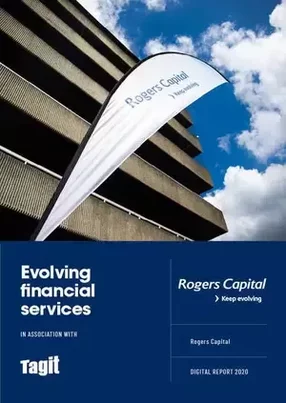“I have always been driven by curiosity,” reveals Evyn Valayten, Head of Digital Transformation at Rogers Capital. “We are looking for new ways of working and finding solutions to the problems our teams face.”
Evyn is part of the DNA of Rogers Capital; in his 17th year with the company, he has been tasked with driving a four-year strategic transformation plan for digital and culture change. This strategic plan is based on three key pillars: Employee Experience, Customer Experience and Operational Excellence.
A digital transformation journey
“We are in the first year of a four-year journey that starts with our employees,” explains Evyn. “We have begun with the release of our employee portal; because we know if our staff have a positive experience, this will reflect well with our customers. We did several workshops with higher management and operations chiefs and chose to focus on our internal teams to start this journey. On the first release of this portal, we have delivered a self-service solution to make the headshot process paperless.
“It is important that we correctly define digital transformation,” reasons Evyn. “Simply put, it is the ability to understand how technology can deliver value to customers. It is not purely about the tools themselves, but how to leverage the capabilities of these tools to take advantage of new opportunities.” Evyn stresses the importance of asking probing questions at Rogers Capital to define what their digital transformation journey needs to achieve. He believes it is important to know yourself and who you want to be, understand your resources in terms of budget and skill sets, assess competition and their proposition as well as never losing sight of the end customer and how best to reach and service them. That journey is made easier by synergies across the business which give Evyn’s team in-house support, more specifically, support from RCTS. “We have a technical team of 125 FTEs, able to design, implement and secure everything from laptops to high-end servers.”
Building intelligent solutions
Tackling legacy systems and processes in a push to go paperless is a vital part of Evyn’s team’s culture change mission. “We are investing in iBPM (Intelligent Business Process Management) to move towards phasing out printing and manual signing. We are testing RPA (Robotic Process Automation) to give time back to our employees by relieving them of repetitive tasks.”
Evyn believes the key to a successful digital transformation journey is working backwards by choosing the experience first, and then the technology to meet that need. “We have been workshopping around our staff experience,” he confirms. “Around 75% of our team working has been a backward strategy – looking at the situation and how we can make it better, then choosing the technology that would enhance the process. We can see the culture change already as our people are coming up with new ideas and participating in the ecosystem we are building with a cycle of innovation.”
Partnering for equitable results
Over the past two years, Rogers Capital has been working with the app’s developer Tagit Mobile to support its financial services division. The Singaporean company is behind the award-winning Moebix digital engagement platform that enables banks and government entities to create and enhance their digital capabilities. “Internally, an iBPM (intelligent Business Process Management) solution was implemented for Rogers Capital to build solutions around web apps to the mobile app in iOS or Android,” explains Evyn. “This gives us real-time access to data anywhere while keeping cybersecurity paramount.”
In the push to go paperless, Rogers Capital needed a user-friendly solution. Multiple solutions were considered but Evyn explains that the document management system from M-Files has been a sterling addition. Over the past decade, M-files has been used for migrating data from file servers with reliability and speed to provide document-scanning services for clients.
Rising to the challenge
“We are hoping to expand the team of developers working with us,” says Evyn. “However, it has proved difficult finding developers with the right technical skills to be the architects here in our sector. One of my main worries for the coming years will be the need to outsource to achieve the required competencies as we add new solutions to our growing list of services. Developing these new modules is key to how we deliver to our clients.”
Managing expectation with change is a balancing act for Evyn. “These days, everybody wants everything quickly,” he says. “Our teams are keen to get new functionalities and the appetite for change is growing. However, we must work at a steady pace within the framework of testing to ensure the security of new solutions.”
Reacting to the trends
“The trend today in many companies is firstly implementing digital tools and then forcing outdated policies and procedures over them,” says Evyn. “We often hear of success stories of Airbnb and Uber and it is crucial to recognise that one important and common feature with these enterprises is that they were born digital. If your company already has a strong culture and has been successful before the digital age, it will most likely be difficult for you to be the next Airbnb, or to even learn from their experience. We need to learn from those non-digital native companies, learn from their successes and failures as they had to go through the challenge of unlearning non-digital ways of working.”
Access to information 24/7 has become the norm today, Evyn notes. “You want to buy something? You just go on Alibaba’s website and within minutes you are done making your purchase and waiting for the delivery. I see that desire in our businesses. Our customers are looking for the same kind of experience, and we are supporting that with our employee and customer portals to reflect that desire internally and externally with new ways of working.”


